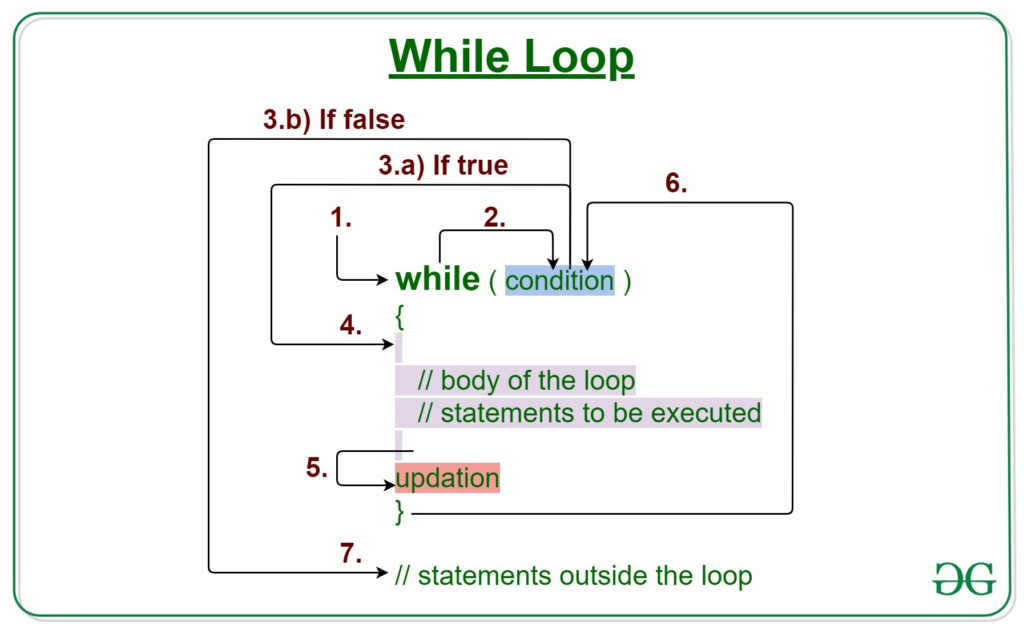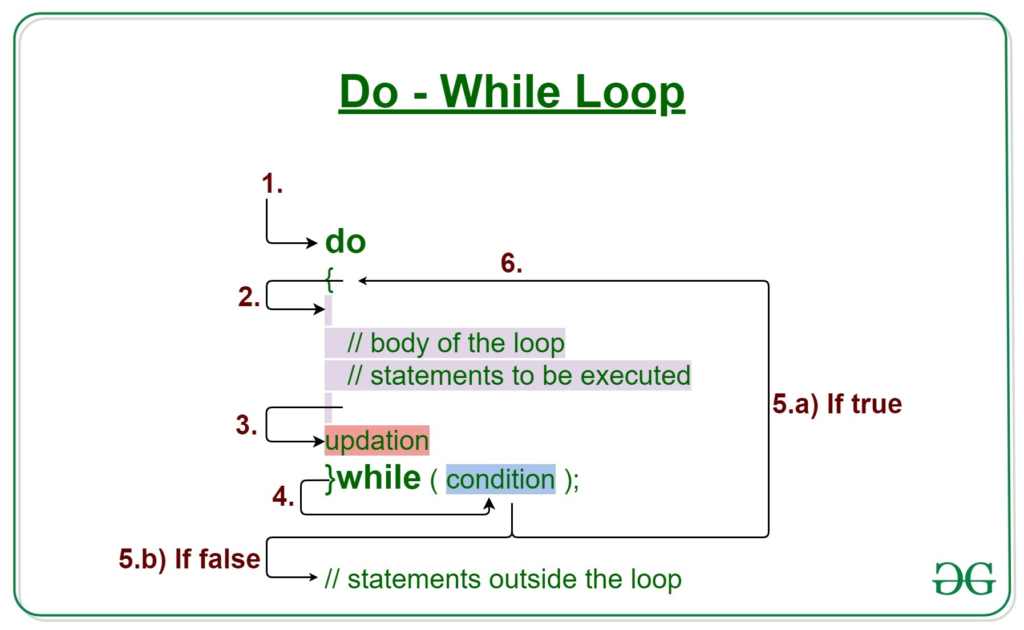Loops in C
Definition:
Loops in C are control structures that allow repeated execution of a block of code. They are used when you need to perform a task multiple times, saving time and reducing redundancy in your code.
Read Also – Operators in C
Types of Loops:
- For Loop
- While Loop
- Do-While Loop
********************************************************************************
1. For Loop:
Description:
– Used when the number of iterations is known before entering the loop.
Syntax:
for (initialization; condition; increment/decrement)
{
// Code to be repeated
}
Example 1: For Loop
#include <stdio.h>
int main()
{
// For Loop Example
for (int i = 0; i < 5; ++i) {
// Code to be repeated
printf("Iteration %d\n", i);
}
return 0;
}
Execution Flow:
- The for loop is initiated with the initialization statement int i = 0;. It initializes the loop control variable i to 0.
- The condition i < 5 is checked before each iteration. If true, the loop continues; otherwise, it exits.
- Within the loop, printf prints the current iteration value of i.
- The increment statement ++i increases the value of i by 1 after each iteration.
- Steps 2-4 are repeated until the condition becomes false.
********************************************************************************
2. While Loop:

– Description:
– Continues as long as the specified condition is true.
– Syntax:
while (condition) {
// Code to be repeated
}
Example 2: While Loop
#include <stdio.h>
int main()
{
// While Loop Example
int i = 0;
while (i < 5) {
// Code to be repeated
printf("Iteration %d\n", i);
++i;
}
return 0;
}
Execution Flow:
- The loop control variable i is initialized to 0 outside the loop.
- The condition i < 5 is checked before each iteration. If true, the loop continues; otherwise, it exits.
- Within the loop, printf prints the current iteration value of i.
- The increment statement ++i increases the value of i by 1 after each iteration.
- Steps 2-4 are repeated until the condition becomes false.
********************************************************************************
3. Do-While Loop:
– Description:
– Similar to the while loop but checks the condition after the block of code is executed, ensuring the code executes at least once.
– Syntax:
do
{
// Code to be repeated
} while (condition);
Example 3: Do-While Loop

#include <stdio.h>
int main()
{
// Do-While Loop Example
int i = 0;
do {
// Code to be repeated
printf("Iteration %d\n", i);
++i;
} while (i < 5);
return 0;
}
Execution Flow:
- The loop control variable i is initialized to 0 outside the loop.
- The code within the loop is executed at least once because the condition is checked after the block of code.
- Within the loop, printf prints the current iteration value of i.
- The increment statement ++i increases the value of i by 1 after each iteration.
- Steps 2-4 are repeated until the condition becomes false.
********************************************************************************
Loop Control Statements:
1. Break Statement:
– Description:
– Exits the loop prematurely.
Example:
#include <stdio.h>
int main() {
// Break Statement Example
for (int i = 0; i < 10; ++i) {
if (i == 5) {
break;
}
printf("Iteration %d\n", i);
}
return 0;
}
2. Continue Statement:
– Description:
– Skips the rest of the code in the loop and proceeds to the next iteration.
Example 4: Break Statement
#include <stdio.h>
int main() {
// Break Statement Example
for (int i = 0; i < 10; ++i) {
if (i == 5) {
break; // Exit the loop when i reaches 5
}
// Code to be repeated
printf("Iteration %d\n", i);
}
return 0;
}
Execution Flow:
- The for loop is initiated with the initialization statement int i = 0;.
- The condition i < 10 is checked before each iteration. If true, the loop continues; otherwise, it exits.
- Within the loop, the if statement checks if i is equal to 5. If true, the break statement is executed, exiting the loop prematurely.
- If the break statement is not executed, the printf statement prints the current iteration value of i.
- Steps 2-4 are repeated until the condition becomes false or the loop is exited with break.
Example 5: Continue Statement
#include <stdio.h>
int main() {
// Continue Statement Example
for (int i = 0; i < 10; ++i) {
if (i == 5) {
continue; // Skip the rest of the loop for i = 5
}
// Code to be repeated
printf("Iteration %d\n", i);
}
return 0;
}
Execution Flow:
- The for loop is initiated with the initialization statement int i = 0;.
- The condition i < 10 is checked before each iteration. If true, the loop continues; otherwise, it exits.
- Within the loop, the if statement checks if i is equal to 5. If true, the continue statement is executed, skipping the rest of the loop for the current iteration.
- If the continue statement is not executed, the printf statement prints the current iteration value of i.
- Steps 2-4 are repeated until the condition becomes false or the loop is exited.
- AI Tools for Developers: Top AI Tools Every Developer Should Know in 2026 - February 12, 2026
- What is AI? 7 Powerful and Easy Facts – Complete Beginner Guide - February 12, 2026
- How to Set Up an Okta Account – Easy & Secure Step-by-Step Guide for 2026 - January 9, 2026

